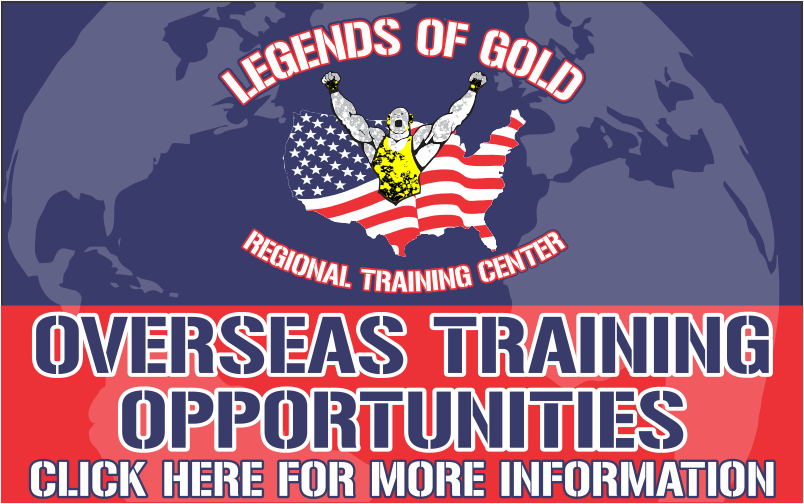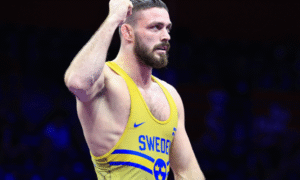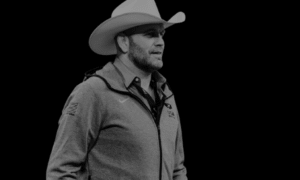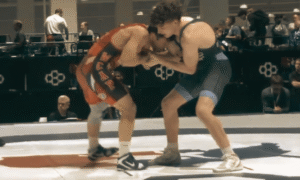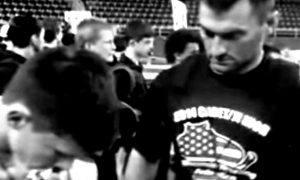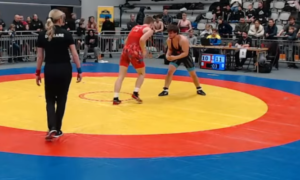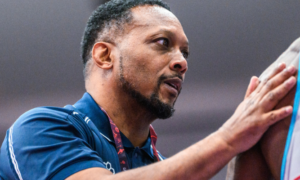Five Point Move is proud to host USA Greco-Roman National Team head coach Matt Lindland each week for Coach Lindland’s Report. Here is where you will find detailed perspectives from Coach Lindland regarding results, training, upcoming events, and other Greco-related news that isn’t available anywhere else. ALSO — if you would like to donate directly to the US Greco-Roman program, just click here. Your support is appreciated!
It came and it went just like that — January National Team camp at the US Olympic Training Center is now a memory, and Coach Lindland goes over some of the particulars from the week-plus training collective. After that it’s onto this week’s Dave Schultz Memorial and how the season unfolds from then on. Finally, it’s the age-groupers and the recent announcement that FLOWrestling’s “FLO Nationals” will serve as the qualifier for the Cadet Pan American Championships.
5PM: Maybe they’ve been training, but given the timing for some of the attendees at the camp, did you notice any signs of rust that needed to be dealt with? Or did everyone unanimously come in pretty sharp?
Coach Matt Lindland: I think for the most part guys came in with the expectation that they were training and getting ready for competition. This camp leads right into Schultz because it helps our clubs a lot, especially for our National Team members since we were able to fund their trip. And then we’ll just fly them back after the tournament instead of flying them home with their clubs having to bring them to another event.
Everyone was well aware they were coming out for competition. They seemed to adapt pretty well. I think acclimation to altitude is always a thing — no matter what. I think some people need a couple of days to get over the elevation. Some guys can just deal with it, guys who have lived here before or in places that have high elevation. They don’t seem to be affected as much.
I think everyone came in eager to get to work. As far as what we did as a National staff, we set clear goals and expectations. We’re trying to develop some good standards so they can expect what we’re looking for. We had eight training sessions. It’s not a big camp as far as lots of volume because for one, it’s the first camp of the year, and two, it leads right into a competition. We wanted to test their durability, their resiliency. And what the guys who are here are showing is the desire to be here and be part of the program. Everybody is making a lot of efforts. I announced at the beginning, Hey, my goal is to see you get through this camp and we’re going to go from there.
5PM: You mentioned it last time that this was going to be a focus, so how have the meetings gone?
ML: I think we got a lot accomplished in every one of these meetings. I was able to do Friday’s meeting during the morning briefing session, so we were able to give the guys Friday night off. They could relax, play some games, socialize with their teammates. Saturday was an active recovery day and I saw a lot of guys going on hikes, climbing some mountains, getting in the sauna, on the bikes — guys doing what was asked of them without any supervision. That’s really what you want your athletes to be like, to be self-directed and act as their own self-coaches. You want them to take care of business even when someone’s not watching them. From all accounts and from what I saw, guys were getting their work in with Sunday being a complete rest day. Which they needed, we had six mat sessions in our first week, so there was quite a bit of time on the mat.
There was also some live; we had situations early in the week and matches later in the week. The last day we finished with a review of what we covered. Mohamed (Abdelfatah) went over a lot of techniques to make sure we’re all on the same page technically. The guys had the rest of that practice on their own and everyone stuck around. They were really engaged and wanted to improve — in different areas (laughs). No one had the same thing they wanted to work on. So we’re working high locks with Travis Rice, Austin Morrow wanted to work on two-on-one’s, and Taylor LaMont wants to work on something else. Everyone wanted to work on individual things that day and it was great. You had a lot of great wrestlers in the room, a lot of great wrestling minds, and everyone was working together and sharing, just helping our program grow. It was really great.
5PM: So morale overall has been high at the camp?
ML: Morale has been really high. I think the athletes are seeing what they want to see. They are seeing people being held to a higher standard, they’re seeing accountability.
Accountability is one of the items we wanted to work on last year. It’s one of the five areas we’ve talked about ad nauseum, and I think it was a great area. We are getting better at communicating. Before every morning practice we’re getting the guys together, having a quick check-in, and going over what the plan is for the day. Maybe introduce what we’re going to talk about that evening and why they are going to want to be at that meeting. Not that we’ve gotten full compliance; there are some guys who may think some meetings are more important than others. The problem with that is they’ll miss out on some valuable information.
This past week, we: selected all of the coaches for all of the tours with the Greco-Roman Sport Committee; we finalized our schedule and wanted to get that out; and we finalized the Trials procedures for every age-group including Seniors and we wanted to get that information out. In my estimation, all of these meetings are important if you’re a part of this program. This is information you’d want to have. One of our other areas is trust and respect, and if you’re going along with that, then I’d think you’d want this information and want to attend. Sure, we’ll send some emails out and it’ll be discussed and posted, but you might have some questions as to why the procedures are laid out in a certain way. You want to clear these things up and get them out of the way in case people have questions, but how can you do that if they weren’t there?
I think everything is important, and I think the morale is raising because there are so many guys in our program who are disciplined and structured. They just want to see the rest of their teammates on the same page as them. Because — we do have a mission to complete. We have to get ourselves to the World Championships and perform at our highest level at those events. We have to get six guys qualified for the Olympic Team. All of these things are coming up quickly and we’ve got 19 months until Tokyo. We want to get things in order and rolling now, we don’t want to fix cultural problems as we head into the Olympics. We want to be making small technical adjustments and getting our guys prepared to compete.
5PM: There was a group of athletes who trained with Ivan Ivanov in Idaho, several World/National Team members like RaVaughn Perkins, Kamal Bey, Patrick Martinez, Jesse Thielke, and Hayden Tuma. Have you received reports on their progress?
ML: I had a great conversation with Ivan, he’s working on getting some (foreign) National Teams out here, possibly the Serbian team or Bulgarian teams. We might get a chance to train with them, maybe in May, maybe in July. We quite haven’t figured out their schedule yet. We have a pretty tight schedule this year because the Worlds were so late last year and they are earlier this year, and we’re just a few months away from competition. What are we, eight months from the World Championships already? And that’s our first qualifier for the Olympic Games, so things are compressed. Especially with our National Team selection and Trials, it gets compressed. The Pan American Games this year are going to be our pre-World tour. It’s nice to see that Belarus tournament (Oleg Karavaev) is going to drop around that same time in July, so hopefully we can get our non-Olympic weights — we actually call those our “World weights” — to a pre-tournament, as well, provided everyone is on the same plan and the same page. I think there is just a couple weeks between those two events.
I’m hoping there is an opportunity to roll with the Serbian team or something like that, but that is going to have to be squeezed into our schedule depending on when they arrive.
But yeah, Ivan and I talked quite a bit about the training they had up in Northern Michigan the week before, and then he was taking time for some athletes he wanted to work specifically with. I think there were some questions like, Is that the best time for these guys to go? I don’t know the right answer. I do know we had some mini-camps for athletes last year, guys like Adam Coon and Cohlton Schultz, and they were very effective. Both of those guys came home with World medals. So is sending these guys out for mini-camps an advantage? We don’t know for sure yet, but it’s what our athletes wanted to do and Ivan wanted to work with our guys.
Timing-wise, I probably would have liked to have everyone here to get on the same page. But I did have meetings with Patrick, Kamal, and RaVaughn before they left. There was some information we wanted to get out about our Teams. We want to work on that communication, we want to instill that sense of urgency. A lot of guys here really are professionals and don’t have a problem with image and professionalism. I even had one of our Marines, Dan Miller, talk about what goes on in their culture. It’s obviously a little different, they are part of the Armed Services, but the things he talked about… For instance, he talked about how, He’s are a Marine; he can be a Marine wrestler, but he’ll still be a Marine. There are standards to be part of the Marine Corps, and there are standards to be a part of the All-Marine wrestling program — and they are different and they are voluntary. He used an example regarding UWW (United World Wrestling). Well, UWW has a set of rules that we compete under. They don’t change the rules for each wrestler, just like an organization doesn’t change the rules for any individual. They have a standard and the athletes in those programs need to fit into those standards. I think he did a great job of laying out what those standards are.
As a resident program here at the training center, there is a set of standards our athletes have, and they are higher than what other programs have. And we hold our guys accountable to different things, and so does the training center — and, if we don’t, they will. That’s when things go bad.
5PM: Finally, this week it was announced that the FLONationals is now switching over to the international styles and will act as the qualifier for the Cadet Pan Ams. Is that a developmental step in the right direction you’ve been looking for, especially in regards to its mainstream implications?
Coach Matt Lindland: I think it’s a step back in the right direction.
I remember when I first started this sport, as soon as the state tournament was over, the folkstyle season was over. In recent years since I’ve come back into wrestling after being away for a little while, I didn’t know when the change happened, how folkstyle became a year-round sport. So I think it’s great more guys are wrestling the international styles again. FLO is a monster in the wrestling world as far as events, marketing, and their streaming. Anytime we can get international events to be more important than folkstyle events, I think it’s a value to our programs.
Follow Coach Matt Lindland on Facebook and Twitter for updates on the US Greco-Roman Wrestling program.
SUBSCRIBE TO THE FIVE POINT MOVE PODCAST
iTunes | Stitcher | Spreaker | Google Play Music | RSS



